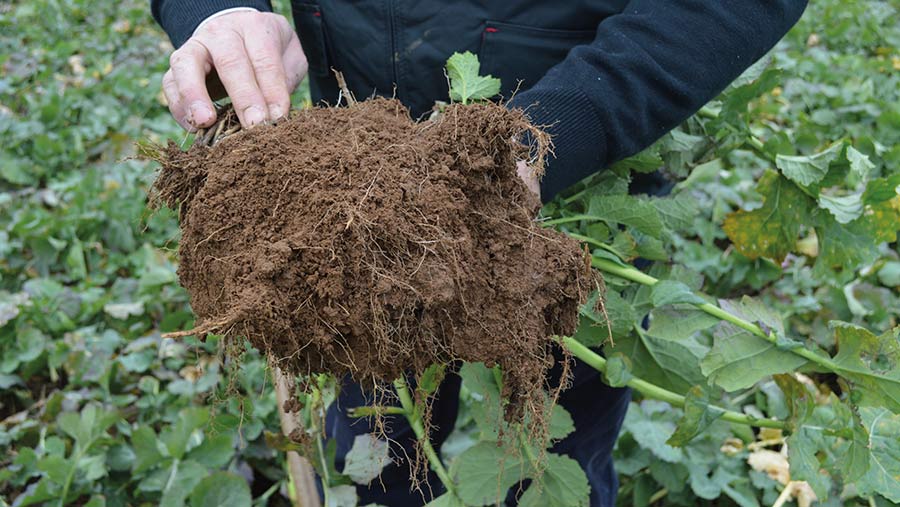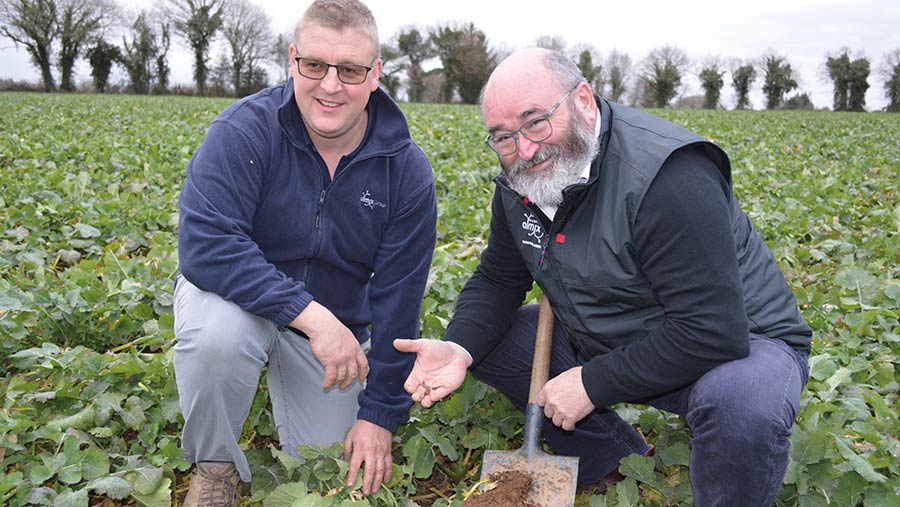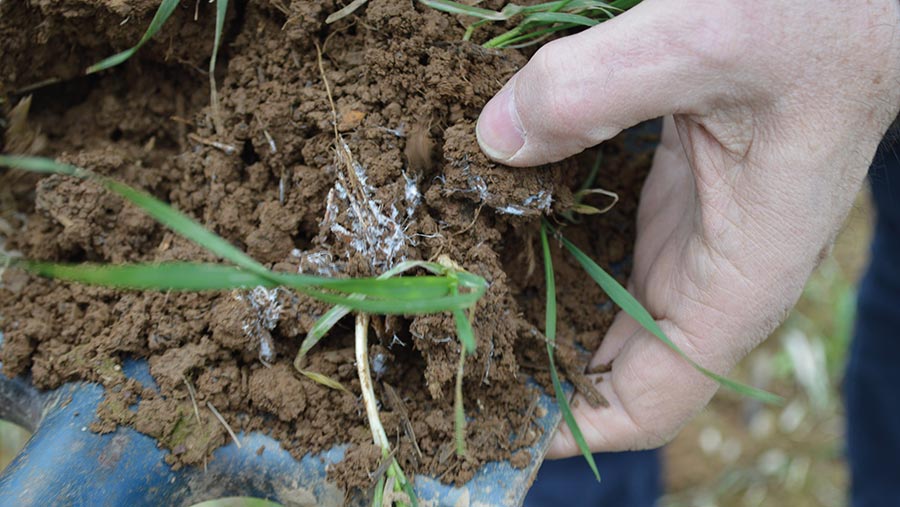Seaweed extract helps French grower cut costs and improve soils
 © MAG/David Jones
© MAG/David Jones Breton grower Fabien Bocher is using a seaweed-based soil biostimulant to help slash his fuel and fertiliser costs, and his soils are becoming more workable and healthy after 10 years of regenerative farming.
The soil biostimulant feeds soil microbes, so his ground is drier and better structured. He applies no phosphate or potash on his crops and nitrogen fertiliser use on his winter wheat has been cut by a quarter.
See also: Why a Polish grower turned to biologicals to cut input costs
He has not used a plough for a decade and while his yields have not risen, they also did not fall dramatically – as his neighbours’ did – after last year’s dry spring and summer heatwave.
“The objective was to reduce working the soil without a fall in yields, and the move to biostimulants was the right decision as I spend less time in the field and the crops are healthier,” he tells Farmers Weekly.
Move to UK market
It is hoped that the soil biostimulant will soon be available to UK growers – in limited quantities this autumn with a full product launch planned for next year.
The product could appeal to arable growers who have little access to manures and whose soils are losing organic matter.
Mr Bocher moved to his farm in 2012 and immediately stopped ploughing, cut artificial fertiliser rates and applied the soil biostimulant.
Within two or three years he was seeing clear benefits from drier, better structured soils after a period of very heavy soil cultivations on the farm.

Fabien Bocher (left) and Benoit Le Rumeur
“In the winter I can go into my fields with only shoes while my neighbours have to wear boots,” he adds.
When he arrived on the farm a decade ago he started to apply the soil biostimulant, called Neosol, in the autumn in a granular form, on his light sandy clay soils.
Neosol helps to develop and feed soil microbes, such as fungi and bacteria, and led to oilseed rape yields reaching up to 4.5t/ha.
“The basis of the strategy is to use the soil biostimulant to improve the soils,” he says. “The next step will be to use a liquid biostimulant to feed the plants and improve yields.”
Sugar-rich algae
Neosol is described as a “soil fertility activator”, and is a mix of 12 key raw minerals and seaweed extract, with a calcium magnesium carbonate carrier to formulate the product into a granular form.
Sugar-rich algae from the seaweed are an excellent food for microbes.
He also uses a soil-applied granule from the Primeo family of products, which is a nutrition stimulator containing a specific mineral formulation.
He does this ahead of his spring planting of crops such as potatoes and grain maize, to give plants better access to soil minerals and water reserves.
Both Neosol and Primeo are classed as organic products.
His initial aim at the farm was to improve his soils by moving to minimum-tillage and direct drilling to repair and then improve his soils damaged by years of heavy cultivation.
Over the 10 years he has been at the farm his soil organic matter has risen by 0.12% a year.
He is growing winter wheat, oilseed rape, grain maize, potatoes and beans on the 72ha he farms at Le Bois de Louarc’h at Saint Connec, near Loudeac in central Brittany.
He has cut nitrogen fertiliser on his winter wheat to 160kg/ha from 210kg/ha previously, with yields as high as 9.5t/ha, while nitrogen on his oilseed rape is as low as 120kg/ha to produce 4.5t/ha yields.
“Yields last year in the dry weather did not show the fall that my neighbours saw, while using less fertiliser and working the soil less,” he says.
Soil biostimulants

Soils were rich in microbes with white fungi clearly seen in this crop of late-drilled wheat © MAG/David Jones
Neosol and Primeo are both produced by French group Olmix, known in the UK as the company that took over Nottinghamshire-based Micromix in 2018.
It brought products such as foliar biostimulants Proplex and Elevate into its portfolio.
The group’s Benoit Le Rumeur, sales development manager of plant care, says the company sources many of its products from a selection of red, green and brown seaweed.
These contain sugar-rich algae and is harvested locally on Brittany’s beaches.
“Our products feed and develop the microbes in the soil and help plants establish. The microbes then help feed the growing plants,” he says.
The use of these products, he adds, can cut nitrogen use by 20-30kg/ha and phosphate by up to 70kg/ha.
Mr Le Rumeur highlights the five basic principles behind the group’s products which encourage good soil-to-plant relations:
- Crop rotation The longer the better, with a good combination of short- and long-rooting crops.
- Tillage Reduced tillage is best, and the use of the plough is harmful to soils.
- Crop protection It is better to target these products onto the plant rather than the soil.
- Fertilisation Use of fertiliser should be modified to encourage microbes which prepare food for plants. Too much fertiliser can make microbes lazy.
- Stimulate plant life This is a result of promoting healthier soils.
Czech trials
The company’s trials with Neosol in the Czech Republic raised yields across a range of crops within a five-year rotation from winter wheat to oilseed rape by 10.6% to 22.8%, and also lowered soil density, while increasing soil porosity, water infiltration and humus content over the five years.
“The soils were easier to work and there was a 20% reduction in fuel consumption over the five years,” says Mr Le Rumeur.
In a rotation of spring wheat-winter wheat-oilseed rape-winter wheat-sugar beet, Neosol was generally applied in the autumn.
The cost of the Neosol is £75-94/ha at an application rate of 150kg/ha (Primeo is similarly priced), but even with this relatively high price, over the five years from 2017 to 2021, the return on investment averaged £148/ha.
Grant James, the group’s sales manager for UK and Ireland, is hopeful these products will be available for UK growers this year.
They will also be tested this season on the Suffolk farm of Jeff Claydon, who also heads up Claydon Drills.
Mr James says: “Pending label requirements, we hope to have a small amount of Neosol and Primeo available this autumn, mainly for growers to test, with a full product launch in 2024.”
What is Olmix
Olmix is based in the centre of Brittany in the town of Brehan, giving it access to seaweed harvested on the north and south coasts.
It was founded in 1995 and is privately owned and controlled by the Balusson family.
Its first products were feed additives for the livestock industry but its move into plant care was speeded up by the acquisition of French group PRP in 2017, and then Micromix in the UK the following year.
The group has four plants – two in Brehan, one in the Netherlands and one former Micromix site at Langar, Nottinghamshire, which produces foliar biostimulants and foliar fertilisers.

